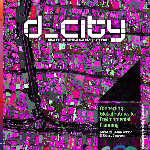Pitch
Our D_City report and network concept diagram promote delivery options for the global Earth observation system of systems (GEOSS) project.
Description
Summary
Our D_City network concept diagram and manifesto/report are the world's first comprehensive explanations of the huge intergovernmental sciences project called the Global Earth Observation System of Systems.
GEOSS was launched the same year as Google Earth (2005) and is today's 'comprehensive global design science' vision to manage our planet's resources via virtual environmental modelling of real world challenges.
It updates Buckminster Fuller's World Game, Spaceship Earth and Geoscope ideas as well as Al Gore's 1992 Digital Earth vision.
The GEOSS co-ordination secretariat, called the Group on Earth Observations (GEO) in Geneva, has 90 nations and 77 international science organisations as members. Its mandate has been extended for a second 10-year period, to 2025.
The D_City: Digital Earth | Virtual Nations | Data Cities report 'slices and dices' (explains various subsets of) GEOSS to inform current and potential urban development professionals about their potentials to lead different aspects of this vastly complex mission.
The report is dedicated to legendary MIT Professor William J (Bill) Mitchell, who invented the currently popular term 'Smart Cities' and was a key mentor of the lead editor, Davina Jackson, when she edited an Australian architecture journal during the 1990s.
The D_City report is online at dcitynetwork.net/manifesto. GEO sponsored two print runs, which have been circulated to (and applauded by) leading geospatial scientists, urban planners and architects.
The Editorial Board includes internationally distinguished scientists, architects and other relevant thought-leaders from the main GEOSS participating sectors: Research, Government, Commerce and Commons. Editors are listed on p2 of the report. The network concept diagram is on p5 (Introducing the Network chapter).
GEOSS is humanity's critical plan to manage our planet via Earth observations technologies that are underpinning what the OECD calls 'the new space economy'.
